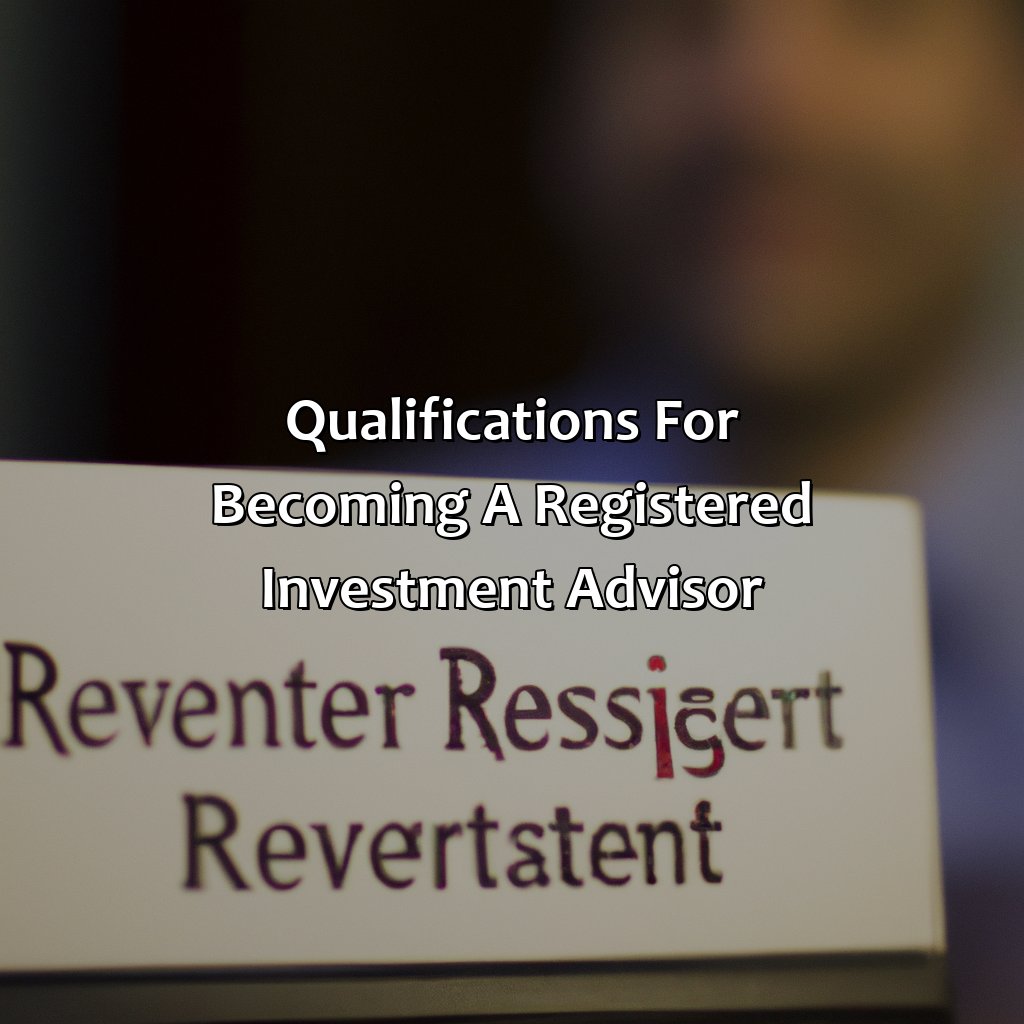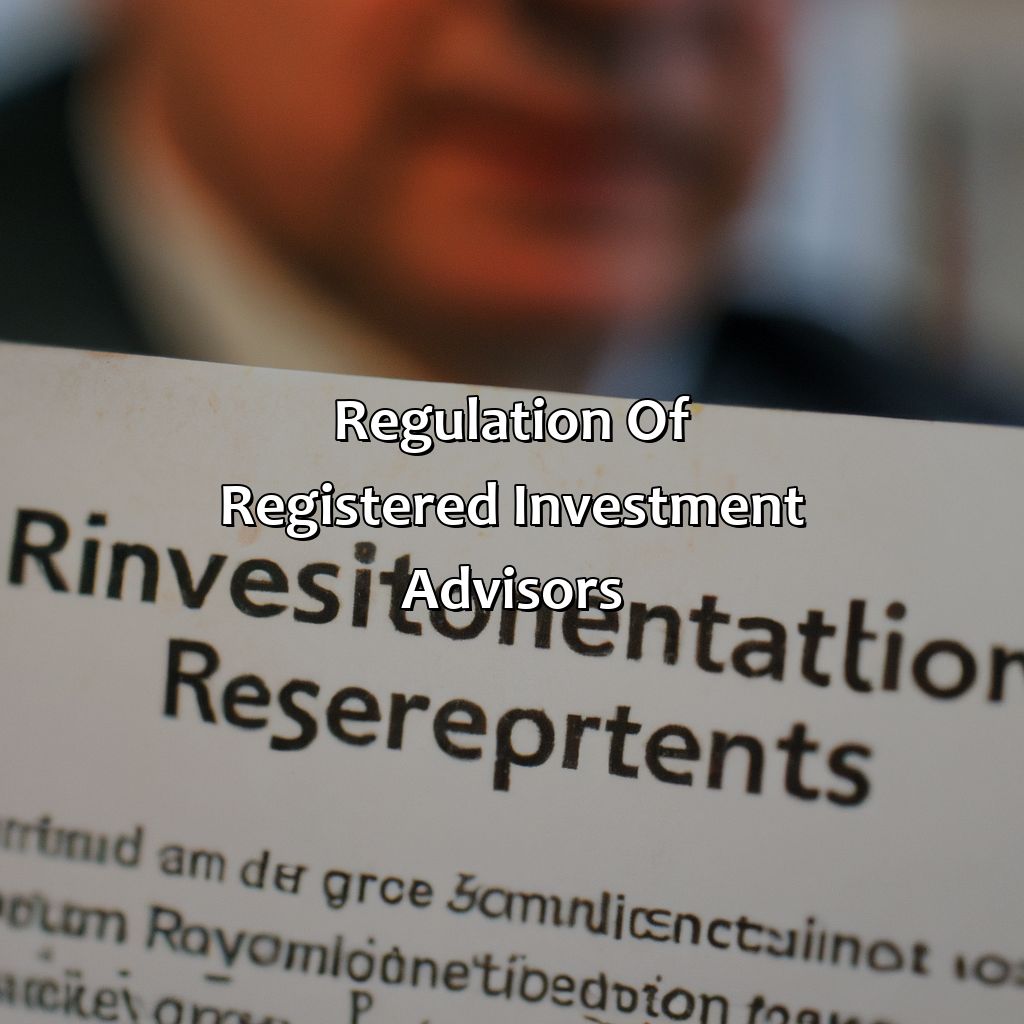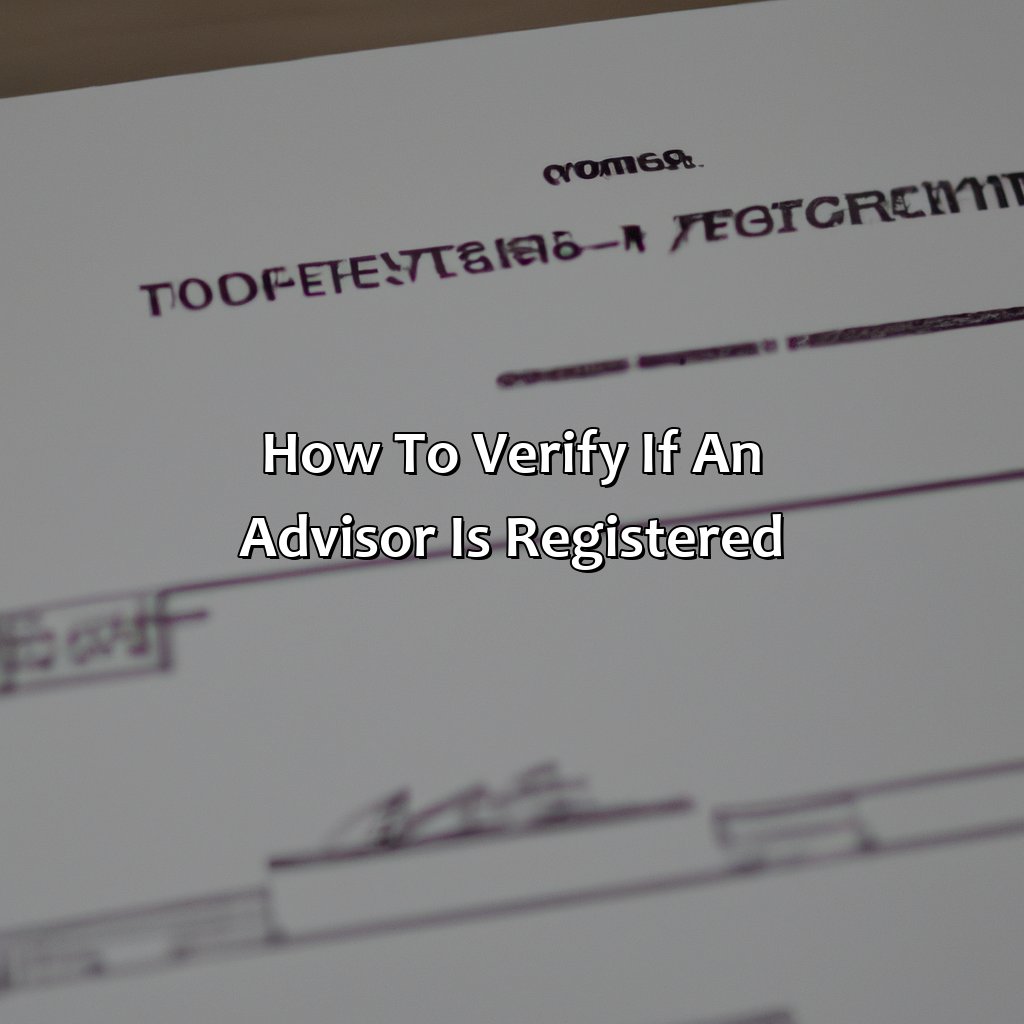What Is A Registered Investment Advisor?
Key Takeaway:
- A registered investment advisor is a professional who provides investment advice and manages money for clients in exchange for a fee.
- To become a registered investment advisor, one must meet certain qualifications, including passing an exam and registering with the Securities and Exchange Commission or state regulatory agencies.
- Hiring a registered investment advisor offers personalized investment planning, objective investment advice, and fiduciary responsibility, which means the advisor must always act in the best interest of their clients.
- Registered investment advisors are regulated by the SEC or state regulatory agencies and must adhere to certain standards and codes of conduct.
- To verify if an advisor is registered, one can search the SEC’s Investment Adviser Public Disclosure (IAPD) website or check with state regulatory agencies.
Are you looking to hire a financial advisor? Do you know the difference between a registered investment advisor and other financial advisors? This article will explain the role of a registered investment advisor, so you can make an informed decision about the right advisor for you.
Definition of Registered Investment Advisor
Registered Investment Advisor – Understanding the Concept
A Registered Investment Advisor (RIA) is a professional financial advisor who has registered with the Securities and Exchange Commission (SEC) or state securities authorities. RIAs provide specialized financial advice to their clients based on their investment goals, risk tolerance, and other factors. They have a legal obligation to act in the best interest of their clients and provide unbiased advice. Furthermore, RIAs must disclose all potential conflicts of interest, including any compensation they may receive for their services.
RIAs offer a wide range of financial services, including investment management, financial planning, tax planning, estate planning, and retirement planning. Unlike brokers, who earn a commission for each transaction they execute for their clients, RIAs earn a fee for their services. This fee is generally based on a percentage of the assets under management, ensuring that the advisor’s interests align with those of the client.
One of the unique features of RIAs is their fiduciary duty to act in the best interest of their clients. This legal obligation requires them to prioritize their clients’ interests above their own. Additionally, RIAs must undergo regular audits by the SEC or state securities authorities to ensure that they are complying with regulatory requirements.
If you’re looking for a financial advisor, consider working with a Registered Investment Advisor. They are highly trained professionals who are held to the highest ethical and legal standards. By choosing an RIA, you can be confident that you’re working with someone who is committed to your financial well-being and has the expertise to guide you towards your financial goals.

Image credits: retiregenz.com by James Jones
Qualifications for Becoming a Registered Investment Advisor
Becoming a Registered Investment Advisor requires specific qualifications and compliance with regulatory authorities. Requirements include proper licensing and passing qualifying exams, adhering to professional standards, and maintaining a fiduciary duty to clients. To be certified, an advisor must also submit a registration form and pay a fee.
Being a Registered Investment Advisor provides legal protections and allows advisors to offer personalized investment advice, but also comes with strict record-keeping and reporting requirements. Suggestions for potential advisors include thoroughly researching the industry and seeking mentorship from established professionals. Continuous education and staying up-to-date on regulations and industry trends is also crucial.

Image credits: retiregenz.com by James Duncun
Benefits of Hiring a Registered Investment Advisor
Hire a registered investment advisor for personalized investment planning, objective advice and fiduciary responsibility! Discover why this can help you reach your financial goals. Investing with a professional who has expertise and experience can be a great solution. Learn more about personalized investment planning, objective advice and fiduciary responsibility!

Image credits: retiregenz.com by Joel Duncun
Personalized Investment Planning
Investment advisors who register themselves with regulatory bodies are known as Registered Investment Advisors (RIAs). They specialize in offering a personalized investment planning that caters to the unique financial circumstances and goals of their clients. This service allows for a tailored approach to investing, resulting in better outcomes for clients.
With a personalized investment plan, an RIA can help you make informed decisions about your investments. They consider various factors such as your age, income, tax bracket, and risk tolerance before presenting you with individualized options. The end result is a portfolio that aligns with your goals and objectives while still being diversified enough to minimize risk.
One significant advantage of working with an RIA is their fiduciary status. As fiduciaries, they must act in their clients’ best interests at all times when making investment recommendations. This commitment eliminates any potential conflicts of interest that may arise when working with advisors who do not hold this title.
A prime example of this came during the 2008 financial crisis where many brokers sold high-risk assets to unsuspecting investors leading them into significant losses; however, RIAs were less likely to make such investments because it did not benefit their clients’ long-term goals. The personalized approach and commitment to client wellbeing allowed RIAs to avoid high-risk investments in the first place.
Objective investment advice is like finding a unicorn: rare, valuable, and usually imaginary.
Objective Investment Advice
The benefits of obtaining objective investment advice from a registered investment advisor cannot be overstated. These professionals are dedicated to providing unbiased guidance that is tailored to the unique needs and goals of each individual client. A RIA can offer expert insights into areas such as asset allocation, risk management, tax planning, estate planning and much more.
By working with a RIA, investors can have confidence in the fact that their advisor is not driven by sales commissions or other incentives. Instead, they are solely focused on helping their clients achieve financial success through sound investment strategies. This level of objectivity and transparency is essential for building trust between an advisor and their client.
What’s more, RIAs are held to a fiduciary standard of care which means that they must always act in the best interests of their clients. This level of commitment ensures that clients receive personalized guidance that is aligned with their specific needs rather than generic advice that may be suitable for everyone but may not necessarily be the best fit for their situation.
Pro Tip: When considering working with an investment advisor, it’s important to choose someone who is both Registered and Certified by a reputable organization such as the Securities and Exchange Commission or FINRA’s BrokerCheck tool. This will ensure that you receive quality advice from a trusted professional who has been vetted by industry experts.
Because when it comes to your money, you want someone with a fiduciary responsibility to have your back… and your wallet.
Fiduciary Responsibility
As a registered investment advisor, a professional is legally bound to act in the best interest of their clients. With fiduciary responsibility, they must put their client’s financial well-being ahead of their own interests or company profits. This includes disclosing any conflicts of interest and providing transparent advice.
A registered investment advisor is not only held to a higher legal standard but also has a moral obligation to act ethically. By putting clients’ needs first, they must provide personalized and unbiased advice that aligns with client goals. This creates trust and demonstrates commitment to excellence in financial planning.
Beyond the legal and ethical obligations, working with a registered investment advisor offers peace of mind that your funds are in good hands. These professionals have undergone rigorous education, training and certification requirements, which translates into knowledge and experience to make informed decisions on behalf of their clients.
Do not miss out on the benefits of working with a registered investment advisor who takes fiduciary responsibility seriously and provides tailored advice that safeguards your finances. Trust an expert for long-term financial success.
Who needs a therapist when you have a registered investment advisor to keep you regulated and financially stable?
Regulation of Registered Investment Advisors
Registered Investment Advisors are financial professionals who provide advice and guidance to clients for a fee. They are regulated by the Securities and Exchange Commission (SEC) or state securities regulators, depending on the amount of assets they manage. Registered Investment Advisors are held to a higher standard of fiduciary duty, which means they must act in their clients’ best interests. These professionals must also adhere to strict reporting and record-keeping requirements to ensure compliance with regulatory standards. In addition, they must disclose any conflicts of interest and provide thorough and transparent information to clients. It is crucial to choose a Registered Investment Advisor with a solid reputation and track record.
Pro Tip: Before seeking the services of a Registered Investment Advisor, conduct thorough research and check references to ensure they are qualified and reputable.

Image credits: retiregenz.com by Yuval Woodhock
How to Verify if an Advisor is Registered
If you’re wondering how to confirm whether an investment advisor is registered, there are a few steps you can take. First, visit the SEC’s Investment Adviser Public Disclosure (IAPD) website and search for the advisor’s name or firm. Next, check whether the advisor is registered with your state’s securities regulator. You can find this information on the North American Securities Administrators Association (NASAA) website by selecting your state from the map. Make sure to verify that the advisor’s registrations are active and whether they have any disciplinary history.
It’s important to note that not all advisors are required to register with the SEC or state regulators. Some are exempt, such as those who only provide advice on specific types of securities or work for financial institutions like banks and insurance companies.
Pro Tip: Always do your due diligence before choosing an advisor. Research their background, qualifications, and any disciplinary history. Don’t solely rely on an advisor’s registration status as a deciding factor.

Image credits: retiregenz.com by Joel Washington
Five Facts About Registered Investment Advisors:
- ✅ Registered Investment Advisors (RIAs) are firms that provide investment advice and manage portfolios for clients. (Source: Investopedia)
- ✅ RIAs have a fiduciary duty to act in the best interest of their clients, meaning they must put their clients’ interests ahead of their own. (Source: U.S. Securities and Exchange Commission)
- ✅ RIAs are regulated by the U.S. Securities and Exchange Commission or state securities regulators and must follow strict compliance rules. (Source: Investment News)
- ✅ RIAs can charge fees based on a percentage of assets under management, hourly rates, or flat fees, among other methods. (Source: NerdWallet)
- ✅ The number of RIAs in the United States has been growing steadily in recent years, with more than 13,000 registered with the SEC as of 2020. (Source: Financial Planning)
FAQs about What Is A Registered Investment Advisor?
What is a Registered Investment Advisor?
A registered investment advisor, or RIA, is a professional who has registered with the Securities and Exchange Commission or state securities authorities to provide investment advice to clients for a fee.
How is a Registered Investment Advisor different from other financial advisors?
Unlike other financial advisors, registered investment advisors have a fiduciary duty to act in their clients’ best interests. This means they must prioritize their clients’ interests ahead of their own. Other financial advisors, such as brokers, are held to a lower standard of care.
How do I know if someone is a Registered Investment Advisor?
You can easily check if someone is a registered investment advisor by using the Securities and Exchange Commission’s Investment Advisor Public Disclosure (IAPD) website. This website allows you to search for a specific RIA by name or location.
What services does a Registered Investment Advisor offer?
An RIA can offer a range of services, including investment management, financial planning, retirement planning, estate planning, tax planning, and more. The specific services will depend on the RIA’s expertise and the needs of their clients.
Why should I hire a Registered Investment Advisor instead of managing my own investments?
An RIA can offer expertise and professional advice that can help you make more informed investment decisions. Additionally, they can help you create a personalized investment plan that is tailored to your specific goals and risk tolerance.
How are Registered Investment Advisors compensated?
RIAs can be compensated in a few different ways. Some charge a percentage of the assets they manage for their clients, while others charge a flat fee or an hourly rate. It’s important to understand the RIA’s fee structure and any potential conflicts of interest before hiring them.


